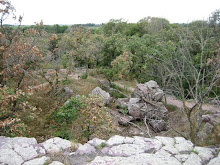not far behind
Spring will astronomically happen to my hemisphere in just a few weeks. My girls are signed up for city soccer, set to start around the same time; let's hope the snow melts.
With spring will come the blossoming of the trees. Why should I love that old trees, crusty barked, fungus and moss barked (this is not ugliness; it is another form of a life grown upon a life), many rings within them, bring out blossoms that, piled with blossoms from younger trees, would be as fresh?
I think of biblical mothers like Sarah and Elizabeth whose babies were utterly young; Isaac wasn't aged at birth; he was as infant as a son born to a younger woman.
Maternity aside, as long as life exists, it can be a fruitful tension between a body that is growing older, a spirit that is ageless, and an agency that can think, speak, and act, renewing (replenishing) the self and the world. Does this reality--if it is a reality--have root in the sustaining paradox of St. Augustine's "love ever ancient, love ever new?"
With spring will come the blossoming of the trees. Why should I love that old trees, crusty barked, fungus and moss barked (this is not ugliness; it is another form of a life grown upon a life), many rings within them, bring out blossoms that, piled with blossoms from younger trees, would be as fresh?
I think of biblical mothers like Sarah and Elizabeth whose babies were utterly young; Isaac wasn't aged at birth; he was as infant as a son born to a younger woman.
Maternity aside, as long as life exists, it can be a fruitful tension between a body that is growing older, a spirit that is ageless, and an agency that can think, speak, and act, renewing (replenishing) the self and the world. Does this reality--if it is a reality--have root in the sustaining paradox of St. Augustine's "love ever ancient, love ever new?"


0 Comments:
Post a Comment
Subscribe to Post Comments [Atom]
<< Home